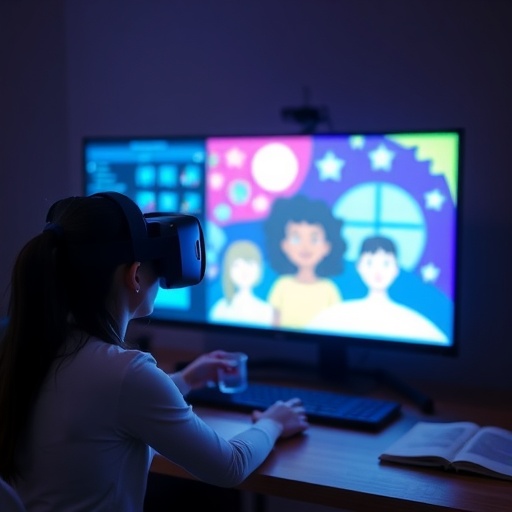The integration of technology into educational methodologies has been a topic of scholarly inquiry and innovation for decades. In the realm of early childhood education, the exploration of virtual reality (VR) as a pedagogical tool has begun to gain traction. With an increasing number of educators and researchers advocating for the discussion and implementation of immersive technologies, a scoping review recently conducted by Papic, Bittner, and Minson highlights the potential benefits of VR in enhancing initial teacher education.
The researchers set out to assess the existing literature and synthesize findings regarding the use of virtual reality in early childhood teacher training. Their review meticulously examined various studies and reports spanning several years, providing a broad overview of the current landscape of VR applications in educational settings. This comprehensive analysis is timely as many educational institutions are in the midst of transitioning towards more technology-integrated curricula.
In their scoping review, the authors emphasize that while traditional teaching methods have their merits, they often fall short of engaging today’s tech-savvy generation of students. Virtual reality presents a powerful alternative that may allow for deeper engagement and experiential learning. VR enables educators to create immersive environments where prospective teachers can interact with various educational scenarios that mimic real-world experiences.
The review sourced a variety of studies showcasing the effectiveness of VR in teacher education, reinforcing the notion that experiential learning is critical, especially in early childhood settings. Prospective teachers who engage in VR training can observe and practice teaching strategies in lifelike settings. This aspect of VR is particularly crucial, given the unique challenges associated with teaching young children, where spontaneity, creativity, and adaptability are paramount.
Moreover, the report delineates specific instances where VR has successfully facilitated teacher training. For example, simulations that allow for the practice of classroom management techniques have been identified as especially beneficial. By donning VR headsets, prospective educators can immerse themselves in virtual classrooms, facing challenges and managing behaviors that they would encounter in real life. This preparatory experience can significantly enhance their readiness for the actual classroom environment.
Another intriguing finding from the review indicates that VR can help bridge the gap between theory and practice for new educators. Traditional educational approaches often focus heavily on theory, which can leave new teachers feeling unprepared when facing real classroom dynamics. However, with VR, educators can visualise, practice, and reflect upon their teaching methods in a safe, controlled environment. This dynamic fosters a deeper understanding of pedagogical principles in practice, empowering teachers to implement what they have learned more effectively once they enter their own classrooms.
Additionally, the emotional and psychological impacts of using VR in teacher education are noteworthy. The review suggests that immersing teachers in virtual environments can enhance their empathy and understanding of diverse learners. Experiencing simulated scenarios involving children with various needs can allow future educators to develop the sensitivities required to address those needs in the classroom. The emotional intelligence gained through these experiences can lead to more compassionate and effective teaching practices.
However, the review does not shy away from discussing the challenges associated with integrating VR into teacher education programs. Permission and access to appropriate technology can often be significant barriers, especially in institutions lacking the necessary financial resources. Moreover, the authors note that thorough training for educators on how to effectively use VR in their teaching practice is crucial. Without proper guidance, the technology can become a distracting gimmick rather than a meaningful educational tool.
Evaluating the long-term impact of VR on teacher education remains an essential consideration. While immediate engagement and excitement around VR can capture attention, suitably measuring its effectiveness in improving teaching outcomes will require ongoing research and follow-up studies. To extend the impact of the review, the authors recommend a systematic approach that allows for an iterative evaluation of VR’s effectiveness in real-world educational contexts over time.
Promoting a culture of collaboration among educators, researchers, and technology developers will also be vital in propelling the integration of VR into teacher education. Partnerships that bring together these parties can lead to innovative solutions and ongoing improvement of the technology and its pedagogical applications.
Furthermore, the review underscores the importance of adaptability in teaching practices, indicating that VR should not be viewed as a one-size-fits-all solution but rather as one of many tools available to enhance teacher education. As the educational landscape continually evolves, so must the methods of training teachers to meet the demands of an ever-changing student population.
In summary, the findings of Papic, Bittner, and Minson’s scoping review illuminate virtual reality’s promising role in the realm of early childhood teacher education. By fostering immersive, interactive experiences, VR has the potential to enhance the preparedness and efficacy of teachers who will play a crucial role in shaping the minds of future generations. As educational institutions consider adopting these innovative technologies, the insights presented in this study provide a vital foundation for a more engaging, effective, and empathetic approach to teacher training.
Aligning with this aim, the authors advocate for continued research and dialogue around the use of virtual reality in education, calling for collective efforts to explore its untapped potential fully. As we look towards the future of education, the fusion of innovative technology and pedagogical practices appears to hold the key to transforming how we train and prepare our educators.
Subject of Research: Virtual Reality in Early Childhood Teacher Education
Article Title: Investigating Virtual Reality as a Resource to Enhance Early Childhood Initial Teacher Education: A Scoping Review
Article References:
Papic, M., Bittner, K. & Minson, V. Investigating Virtual Reality as a Resource to Enhance Early Childhood Initial Teacher Education: A Scoping Review.
Early Childhood Educ J (2025). https://doi.org/10.1007/s10643-025-01942-7
Image Credits: AI Generated
DOI: 10.1007/s10643-025-01942-7
Keywords: Virtual Reality, Teacher Education, Early Childhood Education, Pedagogy, Immersive Learning




